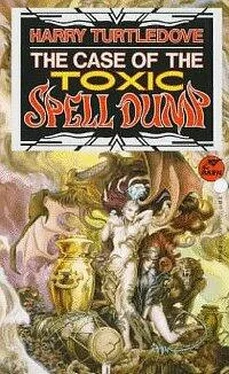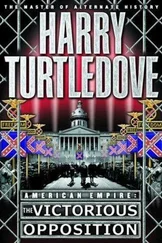The small change went into my pocket, the two-crown note into my wallet. “Thank you, friend,” I told him.
“Any time,” he answered. “See you again soon, I hope. You’re making some sorcerer’s life easier.”
I let that go with a nod. Since I work for the EPA, I would have bet I knew more about it than he did. Recycled aluminum lets magicians use the law of similarity to extract more of the metal directly from the ore; it’s a lot cheaper and more energy efficient than the alchemy they have to resort to when they’re working without any aluminum source… to say nothing of the preposterous and expensive mechanical processes you have to use to coax aluminum free of the minerals that contain it. Were it not for sorcery, I doubt we’d ever have learned what a wonderfully useful metal aluminum is.
Two crowns sixty wouldn’t come close to paying the bill from the Department of Water and Powers I’d found in my mailbox. The bill was up from last month, too; the Department, a little clipped-on notice said, had gained approval for a three percent increase in salamander propitiation fees. Everything costs more these days.
The money I’d got for the aluminum cans would just about cover a hamburger, though not the fries that went with it. A Golden Steeples was right around the corner from the recycling center. I went in there, spent my dividend and a bit more besides. It was a long way from a gourmet treat, but when you’re eating by yourself, a lot of the time you don’t care.
A newspaper rack stood just outside the Golden Steeples: it used the same kind of greedy little imp that dwells in pay phones. I stuck in the right change, pulled out a Times . If I’d tried to take more than one, the imp would have screamed blue murder. I think it’s a shame the racks have to resort to measures like that, but they do. Life in the big city.
Back in my flat, I opened a beer and drank it down while I read the daily. One of the page-nine stories directly concerned me: Brother Vahan was appealing to the Cardinal of Angels City for a dispensation to allow cosmetic sorcery for one of the monks badly burned in the Thomas Brothers fire.
I prayed that the Cardinal would grant the dispensation. Cosmetic sorcery can do marvelous things these days. If the doctors and wizards have a recent portrait of someone before he was burned, they can use the law of similarity to bring his appearance back to what it used to be. Function doesn’t follow superficial form, of course, but a burn victim gains so much by not becoming a walking horror show.
Trouble is, the Cardinal of Angels City is a stiff-necked Erseman who takes the mortification of the flesh and God’s will seriously. The story said he was considering Brother Vahan’s appeal, “but the issuance of a dispensation cannot be guaranteed.” He was liable to decide God wanted that monk disfigured, and who were we to argue with Him?
That sort of attitude never made sense to me. Far as I can see, if God wanted burn victims to stay ugly forever, He wouldn’t have made cosmetic sorcery possible. But then, I’m just an EPA man, not a theologian (and especially not a Catholic theologian). What do I know?
St. George and the Dragon was splashed all over the entertainment section (and I wondered what the Cardinal thought about that ). I hadn’t gotten a good enough look at the blonde by the Hollywood Freeway to tell if she was the one falling out of her minitunic in the ads. I wasn’t about to go to the light-and-magic show to find out, either. That miserable publicity stunt had cost them at least one cash customer.
When I got to work the next morning, more pickets were marching out alongside the Confederal Building to protest the aerial spraying for Medvamps. I shook my head as I went up the elevator to work. Some people simply cannot weigh short-term inconvenience against long-term benefit.
As soon as I got to my desk, I started working like a man possessed; had a priest wandered by, he probably would have wanted to perform an exorcism on me. But I banged through the routine parts of my job as fast as I could so I’d have time to investigate the Devonshire case properly. I wanted to get out to Chocolate Weasel that afternoon.
The best-laid plans—
I’d just managed to get the wood on top of my desk out from under the usual sea of parchments and visible to the naked eye once more when the phone started yelling at me. Unlike some people I know, I don’t usually have premonitions, but I did this time. What I smelled was trouble. The phone hadn’t given me much else lately.
“David Fisher, Environmental Perfection Agency.”
“Mr. Fisher, this is Susan Kuznetsov, of the Barony’s Bureau of Physical and Spiritual Health…”
“Yes?” I’d never heard of her.
“Mr. Fisher, I’m calling from Chatsworth Memorial Hospital. I was going to notify the St. Ferdinand’s chapter of the Thomas Brothers, as is usual in such cases, but due to the recent tragedy there, that was impossible. When I called the East Angels City Thomas Brothers monastery, I was referred to you.”
“Why?” I asked. My mind wasn’t on the Devonshire dump, not that minute. But then, before she could answer, I put together whom she worked for, where she was calling from, her likeliest reason for wanting to get hold of the Thomas Brothers, and their likeliest reason for passing her on to me. “Don’t tell me, Mistress Kuznetsov—”
“I’m afraid so, Mr. Fisher. We’ve just had an apsychic baby born here.”
I don’t know much about babies: call it lack of practical experience. Give Judy and me a few years and I expect we’ll do something about that, but not now. Oh, my brother up in Portland has a two-year-old girl and I have some little cousins up there, too, but I can count on the smelly fingers of both hands the number of diapers I’ve changed.
So poor little Jesus Cordero (the irony of the name struck me as soon as I heard it) didn’t look much different from any other new-minted kid to me. He lay on his tummy in the cradle, wriggling in a sort of random way, as if he didn’t really understand he had arms and legs and could do things with them. The only thing in the least remarkable about him to the eye was an astonishingly thick head of black, black hair.
His mother sat on the side of the bed by the cradle. She was nineteen, twenty, something like that; she might have been pretty if she hadn’t looked so wrung out from giving birth. Her husband had a hand on her shoulder. He was about her age, dressed like a day laborer. They talked back and forth in Spainish. I wondered if they’d entered the Confederation legally, and wondered even more if they truly understood what had happened to little baby Jesus.
In the room with them were Susan Kuznetsov—a middle-aged woman, no-nonsense variety, built like a crate—and a priest. He was a tubby little redheaded fellow named Father Flanagan, but he proved to speak fluent Spainish himself. In Angels City, that’s a practical necessity for a priest these days.
“Any question about the diagnosis, Father?” I asked him.
“Not a bit of it, worse luck for the poor boy,” he answered. Listening to him, I wondered if you could speak Spainish with a brogue. But all such frivolous thoughts vanished as he went on: “I was going through the nursery last night the way I always do, blessing the newborns of my creed. I came to this little fellow and—well, see for your own self, Inspector.”
He took off the crucifix from around his neck, set it against the baby’s cheek, murmured a few words of Latin. That’s not my ritual, of course, but I knew what was supposed to happen: because babies, being new to the world, are uncorrupt, the cross should have glowed for a moment, symbolic of the linkage between goodness on the Other Side and the innocence of the baby’s soul. Not for nothing did Scandinavian converts speak of the White Christ.
Читать дальше












